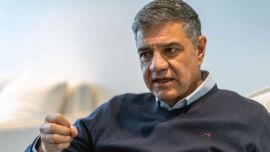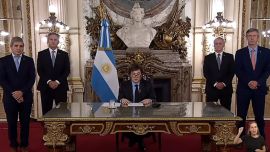All of a sudden, strict party lines blurred in Congress this week, as lawmakers passed unanimously, and with little debate, a bill that officially declares that Argentina to be in a “food emergency.” It is the most honest confession the political establishment could make about its failure to deliver for its people.
The administration of President Mauricio Macri is completing its term in the worst of the worlds possible, hoping to save some votes for October and survive in one piece through the transition in December. This week, in another dose of reluctant pragmatism, the Central Bank killed the money supply freeze that was the backbone of its (failed) anti-inflationary policy, and the government also dropped a fuel price freeze Macri had announced after the PASO primary defeat, just over a month ago.
Macri’s abdication of his governing principle is just the final drop in a long line of political and economic setbacks that afflicts not just his administration but the entire political leadership. While Argentina has attained a surprising institutional instability since the return of democracy in 1983, it has not managed to come up with a sustainable economic direction for the country. On the contrary, poverty in 1983 was below 20 percent. By the end of this year, it will be over 35 percent.
The emergency consensus comes a decade after the country engaged in a fierce political tussle over the distribution of the earnings of Argentina’s food production. The 2008 farm conflict over export duties marked the start of the so-called “grieta” divide that served so perfectly well for both Macri’s rise to power and his predecessor Cristina Fernández de Kirchner’s drive to stay a factor of power. It did not serve the country well, though.
In the fragile condition it is in, Argentina cannot afford further fruitless quibble. The frontrunner Alberto Fernández, who the consensus now says will be the next president, has said he will call business and union leaders in order to reach an agreement over wages and prices, right after he takes office. The goal of the agreement would be to rein in the distribution conflict, under the realistic assumption that there won’t be much to distribute in Argentina in 2020.
This is, of course, easier said than done. As the new president, Fernández will have the clout to sit the country’s leadership down around a big table and tell them what he would expect them to do. Business leaders should commit to keep prices at bay, workers to curb salary demands, all for the sake of lowering inflation expectations. For its part, the next government has to promise to keep the exchange rate stable, likely slightly higher than the current 60 pesos per US dollar and, at the same time, obtain better debt repayment terms for the US$57-billion stand-by loan than the Macri administration got from the International Monetary Fund (IMF).
Fernández is running a campaign as if he were already presidentelect, and warning whoever cares to listen that the road ahead is tough. “It will not be easy to lower inflation,” the candidate is saying, in dire contrast with Mauricio Macri’s 2015 campaign statement that killing inflation would be “the simplest thing to do.”
The opposition hopeful knows that he will have a very short honeymoon if he becomes Argentina’s leader in December, for several reasons. For starters, he is not a popular figure, or charismatic. Secondly, in 2020 Argentine will be crawling into its third consecutive calendar year of recession. Third, although Macri is anticipating some of the tough calls in order to save his own government (such as the capital and exchange control rules), the incumbent is also laying some ticking time-bombs along the way, like tax deductions and the freeze on fuels and utility rates.
The tone of the final sprint of the campaign – which includes two presidential debates next month – will play a role
in how the public assesses the start of the next administration. In this context of stagflation, rising poverty
and unemployment and shrinking wages, the political
establishment does not have much room to be promise-happy. Given the speed of economic deterioration
the country has seen since the run on the peso started
in April 2018, the political leadership should be satisfied
if they just stop the freefall. Many of the people around
Macri and Fernández are aware of this, but it should not
be surprising if they get carried away and forget about the
odd emergency consensus, once the campaign starts in full
swing later this month. Boca and River, after all, will be also
playing do-or-die Libertadores Cup derbies in October. As if
any more distractions were necessary.related news





















Comments